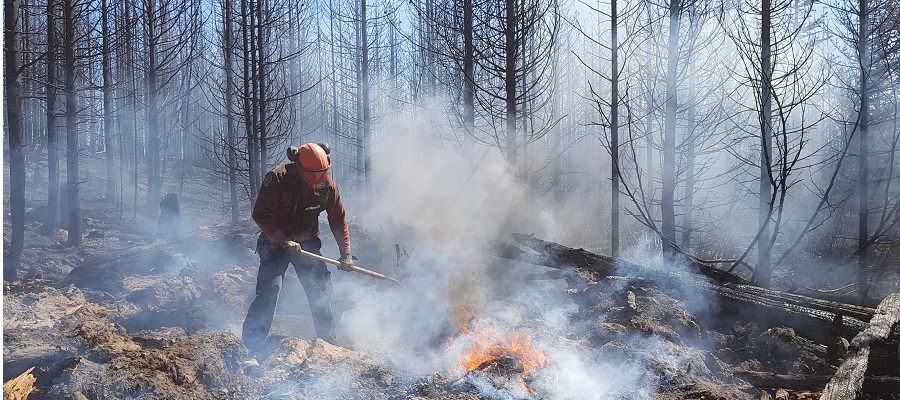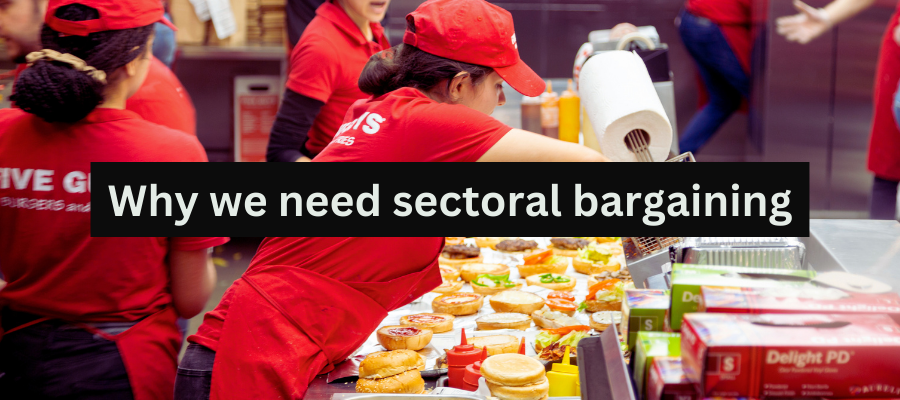The loss of a kind and powerful person – Sandy Cameron
We at the CCPA are saddened by the recent death of Sandy Cameron. Sandy was one of the kindest and most thoughtful people I’ve ever met. And he was a powerful person — not in the sense of formal power, but in the sense of inspiring others through his words and actions as an anti-poverty advocate, poet, thinker, and friend to many, especially in Vancouver’s Downtown Eastside.
In 1999, when the CCPA-BC Office was just a couple of years old, we co-published a collection of essays by Sandy called “Taking Another Look at Class” with the Carnegie Community Centre Association. In his thoughtful and compelling way, Sandy made the case for understanding class as one of the most persistent and problematic features of Canadian society, despite the discomfort many often feel about using the language of class. The essays were originally published in the Carnegie Newsletter — “the feisty, straight-shooting, clear-talking, justice-seeking, freely-distributed newsletter of the Carnegie Centre,” as my colleague Seth put it in his introduction to the series.
An image of a mural by the late Bruce Eriksen appeared on the cover of the collection. Ericksen painted the mural in the 1970s, during reconstruction of the Carnegie Centre. It depicts a DTES resident known as “Blind Bill” and features a quote from Anatole France, “The law in its majestic equality forbids the rich as well as the poor to sleep under bridges, to beg in the streets, and to steal bread.”
I’m glad I had the privilege to know Sandy, if not closely. He spent his life working to for justice and to upend the “majestic equality” of a system that forces so many into poverty and hardship. In his honour, here is one of his essays, on why it’s so hard to talk about “class”. You can read a few more of them here.
Why is it so hard to talk about class?
By Sandy Cameron
We don’t like to talk about “class” because we don’t like to be put into a category. We say, “I am who I am, and that’s it.” We are who we are, though, only in relation to others. Human beings cannot live outside a social group. When we think about class, we tend to think of three groups: (1) the rich and powerful who own and control the country; (2) a middle-income group that used to have a secure standard of living but doesn’t anymore; and (3) low-income citizens, often employed in temporary or part-time jobs, sometimes unemployed, many facing poverty in the new competitive global economy.
The richest 10% of Canadians own 51.3% of Canada’s wealth. The poorest 20% of Canadians own minus -0.3% of wealth.[1] That’s a very unfair distribution of the abundant resources of our land. In fact, Canada is one of the most economically unfair nations in the industrialized countries. The Luxembourg Income Study Working Paper 126, July 1995, found that the United States, Ireland, Italy and Canada were the industrial nations with the most inequality, while Finland, Sweden, Belgium and the Netherlands had the least.
Yet we are told by the wealthy that we live in a classless society, and that equality of opportunity is alive and well in Canada. Not even Sylvester the cat would believe that. As a Hamilton steelworker said, “I definitely think I’m part of a class system. Anyone who feels that this is an equal opportunity country is sadly mistaken. I believe anyone who thinks that the son of a doctor has the same things to look forward to as my son, is a fool.” [2]
In spite of the thousands of books that have been written about class in industrial societies, universities are silent on the subject these days—but not entirely, as the references in these articles show. Sure, there’s a crisis in class politics because there’s the crisis of a vanishing industrial society, but let’s not be too hasty here. To a large extent, we are a country with a small political and economic élite, a large number of wage and salaried employees, and many unemployed.
We are seeing a dramatic decline in upward economic mobility, a growing polarization of incomes, and a declining middle class. [3] A class war, usually unreported in the corporate media, is raging full tilt. As Noam Chomsky has said, “…business tastes blood. They think they can roll back the whole social contract that’s been developed over the past century…labour rights, human rights…anything other than making profit tomorrow.” [4]
Today, ordinary Canadians are taking another look at the word “class.” [5] We know that “the bosses are getting rich off our sweat and toil,” as one Hamilton worker said, [6] and another observed, “I really think we need something closer to democracy than we have right now—something a little closer to democracy than the club (class) system that Canada operates on…It’s a very closed network, a club that takes care of itself and doesn’t really care that much about the average citizen.” [7]
Most Canadians don’t have a strong sense of class consciousness. The exception is the business class with its finely-tuned rationale for monetary advantage. Many Canadians will express greater ethnic, racial, gender, or nationalist consciousness than class consciousness, and that’s not surprising in a multicultural society that has a populist tradition rather than a class one, as in Europe. The main feature of a populist tradition is the line drawn between the organized few and the disorganized many—a dividing line not between employers and employees, but between represented and unrepresented. [8]
Populist movements in North America have called for the use of state power to resist the destructive power of capitalist market domination, but they have not been anti-capitalist. They have protested against both big business (especially the banks) and big government. [9] The Reform Party has exploited populist discontent in Canada, but, representing and supported by corporate power as it is, this party displays a false populism that deceives those ordinary citizens who have turned to it in desperate nostalgia.
Class relations are relations of power. They are about who gets what, and how much. They are about who is in and who is excluded. They are about who gets to define what is happening, and who is silenced. Class relations, however, are experienced differently by people according to racial background, ethnicity, gender, and age. [10] Why? Because race, ethnic, gender and age relations are also relations of power, and this complex dynamic requires a lot of inclusive thought.
The myth that Canada is a classless society has made the problems of ordinary citizens invisible, and has impaired their ability to join together to act on their own behalf. People are frightened. The bills keep coming, and the jobs keep disappearing. Frightened people tend to be angry people, and because Canadians have so little class analysis, their anger is directed at those with less power rather than those with more. Instead of class anger, we see racial anger, and anger against unemployed people, people on welfare, immigrants and women. [11]
Class relations, however, have to be considered along with gender and racial relations because classism, sexism, and racism are all powerful forms of exclusion. It is no accident that in our exploitive society the worst jobs at the lowest wages are held by women of colour. To build solidarity, we have a lot of listening to do.
References:
1. Statistics Canada, June, 1987
2. Livingstone, p. 161
3. Livingstone, p. 2
4. Chomsky, p.50
5. Laxer
6. Livingstone, p. 173
7. Livingstone, p. 175
8. Clement, p. 98
9. Clement, p. 98
10. Clement, p. 4
11. Rubin, p. 140
Topics: Poverty, inequality & welfare


